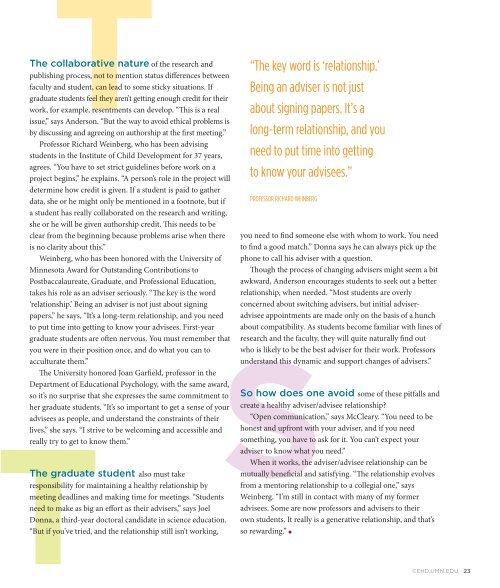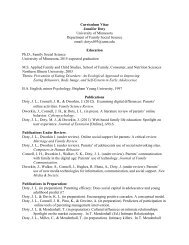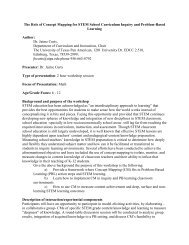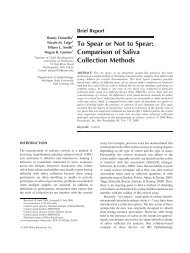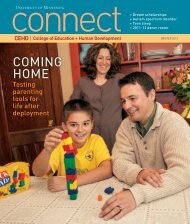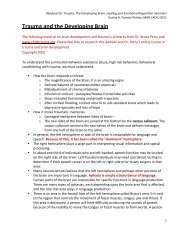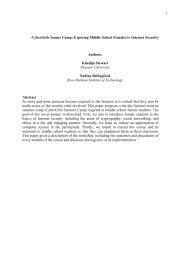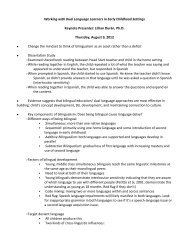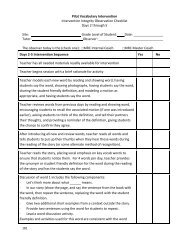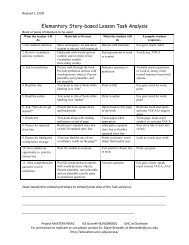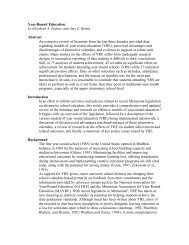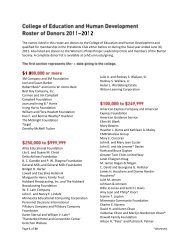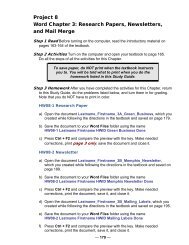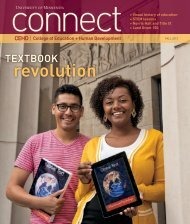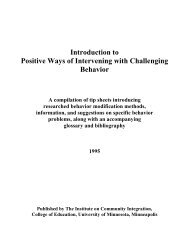connect! - College of Education & Human Development - University ...
connect! - College of Education & Human Development - University ...
connect! - College of Education & Human Development - University ...
Create successful ePaper yourself
Turn your PDF publications into a flip-book with our unique Google optimized e-Paper software.
T The collaborative nature <strong>of</strong> the research and “The<br />
publishing process, not to mention status differences between<br />
faculty and student, can lead to some sticky situations. If<br />
graduate students feel they aren’t getting enough credit for their<br />
work, for example, resentments can develop. “This is a real<br />
issue,” says Anderson. “But the way to avoid ethical problems is<br />
by discussing and agreeing on authorship at the first meeting.”<br />
Pr<strong>of</strong>essor Richard Weinberg, who has been advising<br />
students in the Institute <strong>of</strong> Child <strong>Development</strong> for 37 years,<br />
agrees. “You have to set strict guidelines before work on a<br />
project begins,” he explains. “A person’s role in the project will<br />
determine how credit is given. If a student is paid to gather<br />
data, she or he might only be mentioned in a footnote, but if<br />
a student has really collaborated on the research and writing,<br />
she or he will be given authorship credit. This needs to be<br />
clear from the beginning because problems arise when there<br />
is no clarity about this.”<br />
Weinberg, who has been honored with the <strong>University</strong> <strong>of</strong><br />
Minnesota Award for Outstanding Contributions to<br />
Postbaccalaureate, Graduate, and Pr<strong>of</strong>essional <strong>Education</strong>,<br />
takes his role as an adviser seriously. “The key is the word<br />
‘relationship.’ Being an adviser is not just about signing<br />
papers,” he says, “It’s a long-term relationship, and you need<br />
to put time into getting to know your advisees. First-year<br />
graduate students are <strong>of</strong>ten nervous. You must remember that<br />
you were in their position once, and do what you can to<br />
S<br />
acculturate them.”<br />
The <strong>University</strong> honored Joan Garfield, pr<strong>of</strong>essor in the<br />
Department <strong>of</strong> <strong>Education</strong>al Psychology, with the same award,<br />
so it’s no surprise that she expresses the same commitment to<br />
her graduate students. “It’s so important to get a sense <strong>of</strong> your<br />
advisees as people, and understand the constraints <strong>of</strong> their<br />
lives,” she says. “I strive to be welcoming and accessible and<br />
really try to get to know them.”<br />
The graduate student also must take<br />
responsibility for maintaining a healthy relationship by<br />
meeting deadlines and making time for meetings. “Students<br />
need to make as big an effort as their advisers,” says Joel<br />
Donna, a third-year doctoral candidate in science education.<br />
“But if you’ve tried, and the relationship still isn’t working,<br />
key word is ‘relationship.’<br />
Being an adviser is not just<br />
about signing papers. It’s a<br />
long-term relationship, and you<br />
need to put time into getting<br />
to know your advisees.”<br />
PROFESSOR RICHARD WEINBERG<br />
you need to find someone else with whom to work. You need<br />
to find a good match.” Donna says he can always pick up the<br />
phone to call his adviser with a question.<br />
Though the process <strong>of</strong> changing advisers might seem a bit<br />
awkward, Anderson encourages students to seek out a better<br />
relationship, when needed. “Most students are overly<br />
concerned about switching advisers, but initial adviseradvisee<br />
appointments are made only on the basis <strong>of</strong> a hunch<br />
about compatibility. As students become familiar with lines <strong>of</strong><br />
research and the faculty, they will quite naturally find out<br />
who is likely to be the best adviser for their work. Pr<strong>of</strong>essors<br />
understand this dynamic and support changes <strong>of</strong> advisers.”<br />
So how does one avoid some <strong>of</strong> these pitfalls and<br />
create a healthy adviser/advisee relationship?<br />
“Open communication,” says McCleary. “You need to be<br />
honest and upfront with your adviser, and if you need<br />
something, you have to ask for it. You can’t expect your<br />
adviser to know what you need.”<br />
When it works, the adviser/advisee relationship can be<br />
mutually beneficial and satisfying. “The relationship evolves<br />
from a mentoring relationship to a collegial one,” says<br />
Weinberg. “I’m still in contact with many <strong>of</strong> my former<br />
advisees. Some are now pr<strong>of</strong>essors and advisers to their<br />
own students. It really is a generative relationship, and that’s<br />
so rewarding.” l<br />
CEHD.UMN.EDU 23


